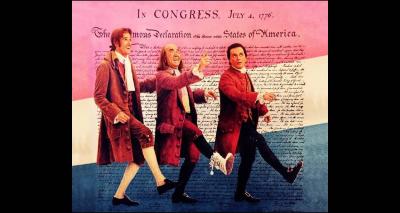1776 (1972)

Photo from review by Joan Amenn, ©1972, Columbia Pictures
Howard Da Silva, William Daniels, and Ken Howard depict Benjamin Franklin, John Adams, and Thomas Jefferson in the "1776" musical.
While the hit musical “1776” is fictionalized and portrays inaccurate history at times, it does a good job of showing how difficult it was for the founding fathers to agree on just about anything.
Centering on the uphill battle of John Adams to convince the Congress to even discuss his proposal for independence, it goes on to depict the struggle to get every delegate to vote for the Declaration of Independence, which, according to the musical, he and Ben Franklin had coerced Thomas Jefferson to write. Delegates from the South demanded that the vote must be unanimous, something that the despairing Adams thinks will be impossible, especially when he clashes with Edward Rutledge of South Carolina over slavery.
Jefferson had included a paragraph condemning slavery as something imposed on the colonies by King George III and called the institution of slavery “piratical warfare,” “execrable commerce” and an “assemblage of horrors.”
The ensuing discussion in the film is played out in two scenes titled "Slavery" and "Molasses to Rum." In these scenes, Edward Rutledge demands that the anti-slavery clause be dropped or he will vote against independence. When Adams objects on moral grounds, Rutledge answers with the song "Molasses to Rum," in which he describes the trade triangle in which New Englanders benefited as much as Southern slave owners. This begins with Rutledge speaking,
“Molasses to rum to slaves
Oh, what a beautiful waltz
You dance with us, we dance with you
In molasses and rum and slaves.”
Then he sings the powerful song:
“Who sail the ships out of Boston
Laden with bibles and rum?
Who drinks a toast
To the Ivory Coast?
"Hail Africa, the slavers have come!"
New England with bibles and rum.And it's off with the rum and the bibles
Take on the slaves, clink clink!
Then hail and farewell to the smell
Of the African coast!”
The usually outspoken Adams has no reply to this exposure of what Southerners called Northern hypocrisy. Advised by Franklin that they must yield to Rutledge, Adams reluctantly agrees and persuades Jefferson to scratch out the offensive paragraph.
Thus, even if you don’t watch the entire musical, the above two scenes are worth watching.
